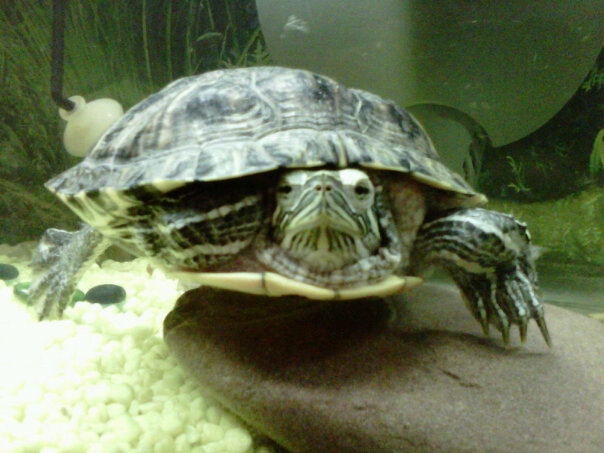Newfoundland and Labrador
Veterinary Medical Association
P.O. Box 818
Mount Pearl, NL A1N 3C8
nalvmaco
News

Pet Suffocation Awareness and Prevention
June 2015
There is a great new website to promote awareness and prevention of Pet Suffocation: http://www.preventivevet.com/pet-suffocationRabies Update
February 2015
Cases of Rabies Confirmed
Four cases of rabies confirmed in Labrador consisting of two red foxes, one wolf, and a dog in approximately one month - Remember to keep your pets current on their rabies vaccine and be cautious of suspicious acting wildlife. For more details visit the link below & talk with your veterinarian.
Creatures of the Rock: A Veterinarian's Adventures in Newfoundland Dr. Andrew Peacock
December 2014
Our very own Dr. Andrew Peacock gave a wonderful snippet of his new book at Chapters in St. John's this past Saturday. The turnout was excellent and Dr. Peacock was available for questions and book signing. His book is available in major book stores across the country and has already entered into second printing. His book has received great acclaim from critics (Maclean's & Amazon), clients, and veterinarians alike. Stay tuned for more information and below is a link to his book on Amazon.ca. Congratulations Dr. Peacock we are so proud of you!

Photo credit: Dr. H. Whitney
http://www.amazon.ca/Creatures-Rock-Veterinarians-Adventures-Newfoundland/dp/038568259X
PANLEUKOPENIA UPDATE - WEB LINKS
September 15th, 2014
The Telegram ran an informative article about the Panleukopenia cases confirmed in St. John's and what is means for your cat please follow the link below...
http://www.thetelegram.com/News/Local/2014-09-11/article-3866548/Potentially-deadly-cat-virus-confirmed-in-St.-John%26rsquo%3Bs/1PANLEUKOPENIA CASES REPORTED IN ST. JOHN'S - WHAT IT MEANS FOR YOUR CAT
September 9th, 2014
NALVMA would like to alert pet owners to the fact that there have recently been cases of feline panleukopenia confirmed in St. John's. This is a potentially deadly infection that can be prevented by proper vaccination of all cats. The vaccine for panleukopenia provides excellent protection and is considered a core vaccine that all cats should receive. Even cats who live exclusively indoors may be at risk, as this virus can be very difficult to kill and can be brought into the home by the owner. Signs of panleukopenia can include vomiting, diarrhea and loss of appetite. Please speak to your veterinarian if you are unsure if your pets may be at risk.Canada's New Anti-Spam & Online Fraud Act
July 2014
As of July 1st, 2014 the new Anti-Spam & Online Fraud Act is in effect. This will change how veterinary clinics communicate with exsisting clients, businesses, and non-business relations. This means that a clinic must send an email to its exsisting membership to allow them to 'opt in' to continue to recieve future communications. The rules also apply to commercial electronic messages ( text messages, sound messages, or voice messages). For a complete compliance checklist please visit the link below!
http://www.canadianveterinarians.net/news-events/news/anti-spam-legislation-july1-2014Animal Health and Protection Act
NaLVMA is very excited to announce that the new Animal Health and Protection Act and accompanying regulations were proclaimed on Wednesday, May 2, 2012. The new Act and Regulation provides improved measures to act on issues related to animal cruelty in the province.
For more information on the new Animal Health and Protection Act and accompanying regulations, or to view the Act, go to:
www.assembly.gov.nl.ca/legislation/sr/tableregulations/tableofregulations_a09-1.html
Highlights of the Animal Health and Protection Act•Five existing live animal statutes (The Animal Protection Act, Dog Act, Heritage Animals Act, Livestock Act and Livestock Health Act) were reviewed and consolidated to form a comprehensive Animal Health and Protection Act.
•The new act provides for stiffer penalties for those individuals convicted under the act, including fines up to $50,000 and imprisonment of up to six months, or both, and a lifetime ban on animal ownership if sufficient to warrant it.
•Under the new act, corporations such as farms and pet stores can be banned from owning animals if convicted of animal abuse.
•National codes of practice will be used to define what is a normal and accepted practice for standard care of animals for agricultural and companion animals.
•The regulations developed to accompany the act further define what is and isn’t acceptable for tethering, such as the amount of time an animal can be tethered. The use of choke collars or choke chains, as well as the use of ropes or cords around an animal’s neck, if the animal is attached to a fixed object, is restricted under the act.
•Dogs must be safely tethered or penned at all times unless on a leash held by a person capable of restraining its movements, being used for lawful hunting or herding sheep, or other purposes that may be defined by regulation. A dog may be kept in a yard if it is safely fenced with no ability to escape.
•Surgical operations for the purpose of modifying the appearance of a pet or animal (docking of tails and the cropping of ears) shall be prohibited unless permitted in a code of practice, for example tail docking in lambs.
•The new act contains a general statement to legally protect animals from distress. Distress is defined as “the state of being in need of proper care, water, food or shelter, being sick, injured, abused or in pain or of suffering undue or unnecessary hardship, privation or neglect.”The previous definition did not include references to water or abuse.
•Animal owners must provide adequate care, food, water and shelter for their animal. If an inspector has reasonable grounds to believe an animal is in distress, the inspector must try to find the owner and obtain the owner’s cooperation to relieve the animal from distress. If the owner is not found or if the owner is unable or unwilling to relieve the animal of its distress, an inspector can seize the animal. Charges can be laid in such cases, where warranted.
•The act specifies that animals cannot be maintained or used for fighting purposes; animals cannot be transported in the back of an open vehicle unless securely attached; animals can not be confined in an enclosed space without adequate ventilation (for example, a vehicle with the windows closed for an extended period of time), and animals cannot be transported in the trunk of a vehicle.
•Veterinarians will now be required to report suspected cases of abuse to the Chief Veterinary Officer and be legally protected from recourse for doing so, unless the information was provided falsely or maliciously.
•Under the new act antibiotics for animals can now only be sold by veterinary prescription, and there are specific animal diseases that must be reported to the Chief Veterinary Officer.
Copyright 2012 Newfoundland and Labrador Veterinary Medical Association. All rights reserved.
P.O. Box 818
Mount Pearl, NL A1N 3C8
nalvmaco
